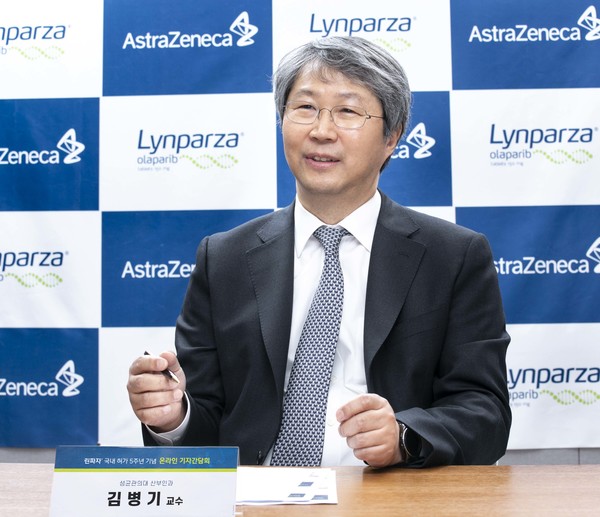Lynparza, AstraZeneca's first PARP (Poly ADP-ribose polymerase inhibitor) inhibitor, celebrated its fifth anniversary after launch, and the company presented its evaluation of the drug's intermediate efficacy on Friday.

"Ovarian cancer patients treated with conventional platinum-based chemotherapy have a median progression-free survival (mPFS) of only 10 to 18 months due to recurrence, and 70 percent of patients experience relapse within three years after primary treatment," Professor Kim Byung-ki of Samsung Medical Center said during a news conference.
The five-year survival rate is only 38 percent, and when recurrence occurs, the period after the first chemotherapy also gradually decreases, he noted.
Kim said that Lynparza is a drug that has pioneered a new treatment option of precision medicine and maintenance therapy for ovarian cancer, where a high recurrence rate was a challenge. He stressed the drug has also consolidated PARP inhibitors' clinical value, as it is the first among PARP inhibitors to present the long-term survival potential of ovarian cancer in the first-line maintenance therapy for BRCA mutation ovarian cancer.
"The treatment has also shown significant overall survival improvement in BRCA mutation ovarian cancer as a second-line maintenance therapy," Kim said.
Kim backed up his evaluation with the real-word clinical trial data from using Lynparza for Korean patients. The study was a multicenter study that retrospectively analyzed the medical data of 100 BRCA mutant platinum-sensitive highly recurrent ovarian cancer patients treated with Lynparza alone as maintenance therapy for two years.
"As a result, the median progression-free survival (mPFS) of patients taking Lynparza was 14.6 months, and the progression-free survival rate (PFS) at 24 months of treatment was 42.4 percent," Kim said. "During the follow-up period, 4 percent of patients discontinued medication due to adverse reactions, and about 23 percent of all patients with adverse reactions continued treatment after appropriate treatment without reducing the dosage."
The study proved that the drug maintained the safety profile of the previous research, he added. The SMC professor also expressed expectations Lynparza would be used in all stages of ovarian cancer treatment.
"PARP inhibitors are a one-time use treatment, and like any other anticancer drugs, more research is needed to use them at all stages," Kim said. "I hope that Lynparza can be used again if cancer recurs after a considerable period after taking the drug."
Kim added that although Lynparza is an all-comer drug that can be used in all types of ovarian cancers regardless of genetic mutation, BRCA genetic testing is still necessary.
"This is because BRCA mutation can be a starting point for not only screening for breast cancer risk, but also finding genetic mutations in a patient's family," Kim said.

